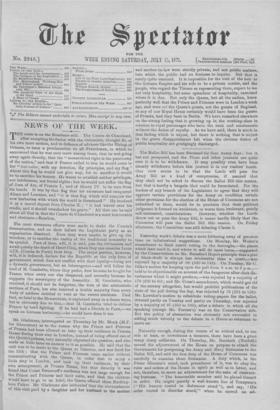The most strenuous efforts were made to shake the Comte's
determination, and on their failure the Legitimist party as an organization dissolved. Even they were unable to give up the tricolour, or to sacrifice the reality of the traditional monarchy to its symbol. Part of them will, it is said, join the Orleanists and await quietly the death of Henri Cinq, when they can consider Louis 1;1X. (Comte de Paris) their king. The major portion, however, will, it is believed, declare for the Republic as the only form of government which does not conflict with their loyalty—being not a dynastic government, but an interregnum—and will follow the lead of M. Gambetta, whom they prefer, first because he fought for France when every one else despaired, and secondly because he supports the sovereignty of the Assembly. M. Gambetta, who received, it should not be forgotten, the vote of the aristocratic sections of Paris, has also received a double majority from every body of soldiers entitled to vote at the recent elections. That fact, so fatal to the Monarchists, is explained away in a dozen ways, but is obviously due to this,—that M. Gambetta tried to deliver France by hard fighting. If ho had had a Double in Paris,—we speak on German testimony,—he would have done it too.






























